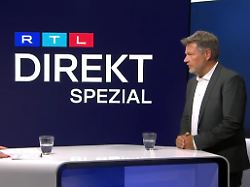Minister at RTL “Am Tisch”
Habeck accuses the Union of an “anti-course”.
09/05/2023, 8:11 p.m
The Building Energy Act is on the agenda of the Bundestag on Friday. The Union will vote against it. Minister Habeck, however, accuses the CDU/CSU of rejecting laws from his house on principle. He accuses CDU boss Merz of “misjudging reality” on RTL.
Federal Minister of Economics Robert Habeck has accused the Union of a less than constructive course in the opposition. The Greens politician said in the program “RTL Direkt Spezial – Am Tisch mit Robert Habeck” that he thinks it’s a shame that the CDU/CSU faction will not agree to the building energy law on Friday.
The complete program “Am Tisch mit Robert Habeck” will be broadcast on RTL on September 6 at midnight.
CDU leader Friedrich Merz said in an “amazing attack of misjudgment of reality” that nothing was going on with the Greens, Habeck continued. “That means that he simply rejects laws from my house on principle.” He thinks that’s a “bit of a shame”.
Politics can be such that you have different points of view, but respect each other and maybe find common solutions, said the Minister for Economic Affairs. “But the opposition has decided on a different course, namely to be anti. Okay, they can do it. I still think it’s a shame.” The Greens politician answered questions from citizens on the broadcast.
With a view to long conflicts about the building energy law, the Greens politician went on to say that a law “of this caliber” would not come again. The building energy law – the so-called heating law – is to be passed in the Bundestag on Friday. The Union and the other opposition parties in the Bundestag failed on Tuesday with an application to delay a decision. A motion not to put the law on the agenda on Friday was rejected by the majority of the coalition factions SPD, Greens and FDP.
The Building Energy Act aims to make heating in Germany more climate-friendly by gradually replacing oil and gas heating systems. It should come into force at the beginning of 2024 – but will only apply to new buildings for the time being.
Habeck thinks the debt brake is “too strict”
In addition, Habeck was fundamentally confident about the prospects for the German economy. With regard to the economic downturn, he said: “We are in a very challenging situation.” But there are political answers and solutions. The federal government has already given some answers. Others are still pending. “We can get out of this. We will get out of this.” Habeck has long been campaigning for a transitional phase for a state-subsidized industrial electricity price – the SPD parliamentary group, trade unions and many business associations also want that.
The Vice-Chancellor went on to say that he was very much in favor of a debt brake in Germany – but believed it was “too strict or inflexible”. With regard to the coalition partner FDP, Habeck said that there would be no reform of the debt brake in this legislative period. The industrial electricity price could be fed from other pots. Habeck suggested financing the industrial electricity price from the Economic Stabilization Fund. Finance Minister Christian Lindner from the FDP made it clear again in the Bundestag that he rejects opening up the fund.
